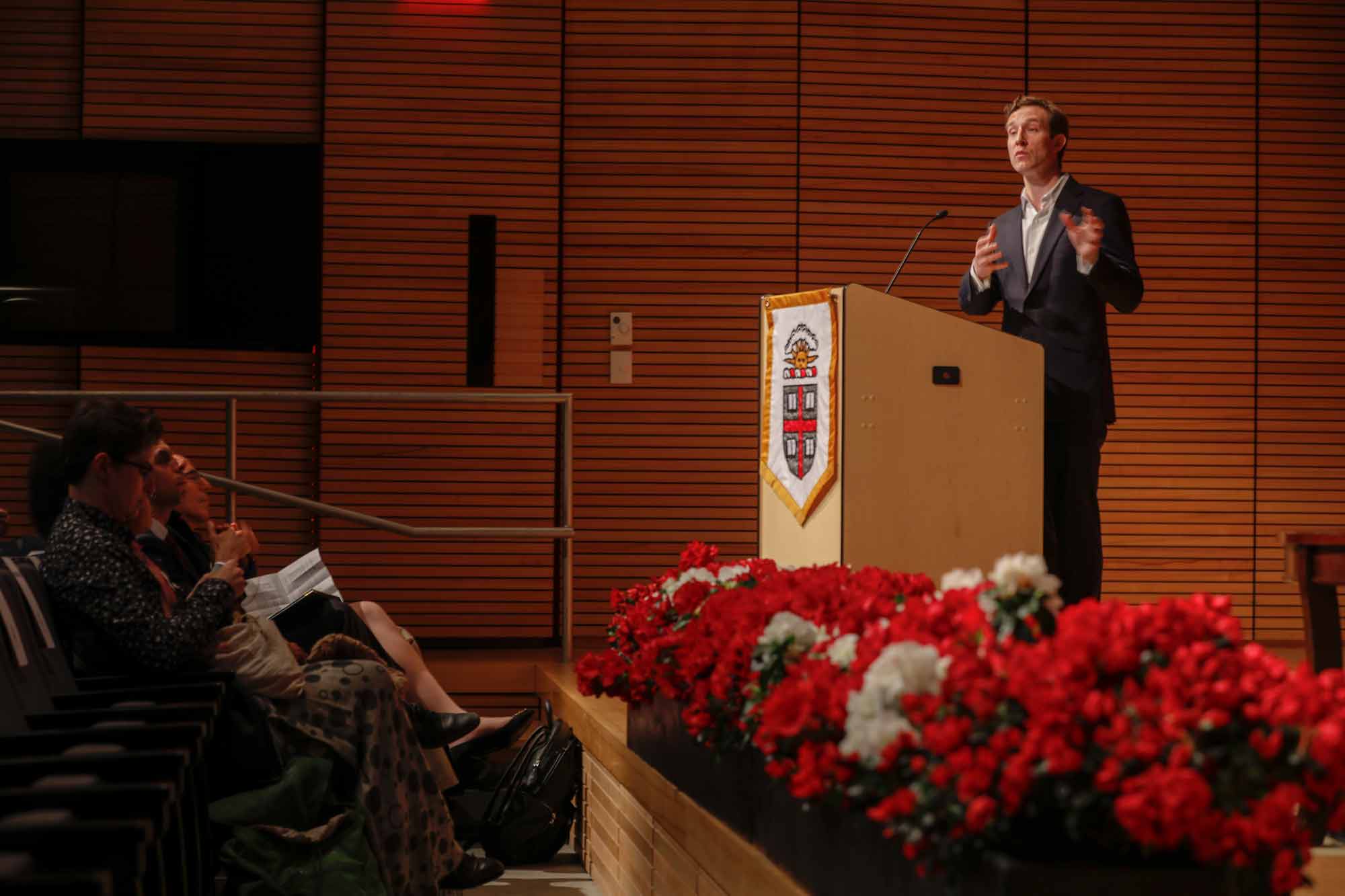PROVIDENCE, R.I. [Brown University] — Leaders from the City of Providence and Brown University convened on Brown’s campus on Monday, April 22, to discuss how they’re working together to identify and improve upon social and economic inequality in Providence.
In a series of presentations and a group discussion, Brown President Christina Paxson, Providence Mayor Jorge Elorza and John Friedman, an economics scholar on the Brown faculty, shared data that identify the most important factors in determining a child’s economic outcome and discussed ways in which the city and the University are partnering to improve outcomes locally.

The event, titled Income Inequality and Social Mobility: Data Meets Policy in Providence, was hosted by the James M. and Cathleen D. Stone Wealth and Income Inequality Project at Brown, which supports research and teaching on the causes and consequences of inequality.
“Reducing income inequality and increasing social mobility in America is one of the most profound policy changes we face,” said Paxson, an economics scholar who has served as a professor at both Brown and Princeton University. “There’s no magic bullet to fix these problems. I wish there were one... I know that higher education really has to play a role.”
Paxson said that Brown plays a role largely through the research its scholars conduct, which ultimately generates policy solutions. At the center of the night’s discussion was the Opportunity Atlas, an interactive, map-based tool that traces the root of adults’ economic outcomes back to the neighborhoods where they grew up. Co-created by Friedman, two colleagues at Harvard and a researcher at the U.S. Census Bureau, the tool allows users to examine household income, incarceration rates and education level at the neighborhood level across the country, including in Providence.
In his presentation, Friedman shared previous research that demonstrated a fading American dream: While those who were born in 1940 were all but guaranteed to fare as well as or better than their parents economically, that guarantee of upward mobility dropped precipitously over the generations. Those born in 1980 have just a 50 percent chance of catching up with or eclipsing their parents in wealth.
Friedman said he and his colleagues discovered through the Opportunity Atlas that a person’s potential for economic mobility correlates strongly with the neighborhood where they spend most of their childhood. As he zoomed in on Rhode Island’s capital city, he pointed to the wide gap in social mobility between neighborhoods such as Upper South Providence and the East Side.
“What’s striking,” he remarked while zooming in on the City of Providence, “is we’re seeing a full range of [outcomes] within a couple of miles of where we’re sitting, even just within the boundaries of Providence.”
But what Friedman found heartening were data that showed improvement in social mobility when children moved to higher-opportunity neighborhoods, even later in childhood.
“It’s not about special moments in kids’ lives: ‘Oh, if we can only fix things by age 5, then we’ll be all set. Oh, if only we can fix college access and get high schoolers on the right path, then we’ll be set...’” Friedman said. “Every year that goes by is another opportunity where either children are getting nudged toward a better trajectory or not. It’s all about the fabric of the community... the adults in the community that can mentor.”
Elorza agreed that a strong community fabric played a large part in his own upward mobility. Elorza, the son of Guatemalan immigrants who did not have the opportunity to attend college, credited his success to his parents’ work ethic and the support of fellow Guatemalan-American families in his Providence neighborhood.
“There was a growing Guatemalan community [in Providence],” Elorza said. “If we fell on acutely difficult times, folks provided an informal social safety net for us. More and more, I am convinced that there is no technical solution to the social challenges that we have unless there is a strong underpinning of a sense of community that brings us together.”
Elorza said Friedman’s Opportunity Atlas has given him a better sense of where the city he leads stands economically, which has allowed him to tailor policy and allocate funding in ways he believes will be most impactful. The atlas has also shown him that existing efforts to close the language gap among Providence children and boost students’ educational enrichment outside of school will indeed be effective ways to boost economic equality.
The mayor also shared that he and Friedman were working together on a project dubbed the “Children’s Accord,” an effort to use Friedman’s opportunity data to show municipal and county leaders nationwide where they should allocate their funds to effect the most change.
“If by coordinating our activities we can amplify the voices of mayors and county leaders,” Elorza said, “then, collectively, we can drive the national agenda on economic and social mobility.”
Friedman said he and his colleagues have learned that working with local leaders has been crucial in harnessing their data to drive change. A policy team from Opportunity Insights, the organization he co-founded, has met with countless public servants all over the country to design policy interventions — including a pilot project in Seattle that aims to pair more landlords with tenants who qualify for Section 8 housing.
“Taking research like this and sticking it on the web is not enough,” Friedman said. “Research like this is not meant to sit in academic journals — it’s meant to be out in the world and being used.”